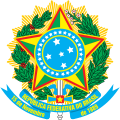This article has multiple issues. Please help improve it or discuss these issues on the talk page . (Learn how and when to remove these messages)
|
| This article is part of a series on the |
| Politics of Brazil |
|---|
 |
Brazil has a multi-party system since 1979, when the country's military dictatorship disbanded an enforced two-party system and allowed the creation of multiple parties. [1] All candidates for federal, state, Federal District, and municipal offices must be nominated by a political party. Independent politicians are not allowed to run for office in Brazil.
Contents
- Active parties
- Parties with representation in the National Congress
- Parties without representation in the National Congress
- Party federations
- Extinct parties
- Historical parties
- Imperial Brazil (1822–1889)
- First and Second Republics (1889–1937)
- Fourth Republic (1945–1964)
- Military Dictatorship (1964–1985)
- See also
- Notes
- References
The Brazilian National Congress has been since characterized by political fragmentation, reaching the apex of 35 in 2018, 30 of which were represented in congress after the 2018 general election [2] [3] [4] , with an effective number of parties of 16.5. [5] An electoral threshold introduced in 2017, which restricted access to party subsidies and free party political broadcasts, combined with the end of coalitions in proportional elections, has caused this number to decrease since. [5] [6] Since 2021, parties are allowed to unite for a minimum of four years, sharing a common statute and leadership, under party federations. [7]
Since the 2022 general election, the Liberal Party (PL), the Workers' Party (PT), the Brazil Union (UNIÃO), the Progressives (PP), the Social Democratic Party (PSD), the Brazilian Democratic Movement (MDB) and the Republicans together control over 80% of the Brazilian Congress, along with over 70% of the mayors in municipalities. [8] [9]
Brazilian parties have access to party subsidies in the form of Fundo Partidário (lit. 'Party Fund') and Fundo Eleitoral (lit. 'Electoral Fund') [10] , and a system of free party political broadcasts during election time known as the horário eleitoral gratuito. [11]
Since 1982, Brazilian political parties have been given an electoral number to make it easier for illiterate people to vote. Initially, it was a one-digit number: 1 for PDS, 2 for PDT, 3 for PT, 4 for PTB, and 5 for PMDB. When it became clear that there was going to be more than nine parties, two-digit numbers were assigned, with the first five parties having a "1" added to their former one-digit number (PDS becoming number 11, PDT 12, PT 13, PTB 14, and PMDB 15).[ citation needed ] Political parties often change their names, but they can retain their number.









